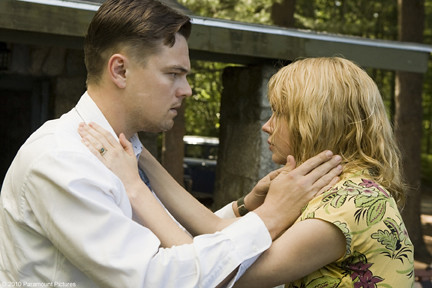The new Scorsese picture, Shutter Island, wasn't screened by WW press deadlines (this is a very upsetting sentence, frankly) but, hey, that gave us a little extra time to muse on it:

Shutter Island
You fooled me again, Martin Scorsese. I didn't think you could do it anymore—not when your last decade of output has been a series of increasingly impersonal, varnished pictures. But with Shutter Island, you managed to sucker me in, make me believe I was seeing a resurrection of your emotional evocation and visual panache. But then you pulled the rug out, and I was left in solitary confinement with flimsy chicanery. And there was still another hour to go. I suppose I should be grateful for the early brilliance, before you ran out of steam.
And there is brilliance in Shutter Island—the saltwater taffy kind, all bright colors and artificial flavors irritating your molars. The director has continued in his diligent struggle to make Leonardo DiCaprio into an old-fashioned movie star—whenever Scorsese looks at DiCaprio, he sees Joseph Cotten. But DiCaprio, who showed signs of adulthood in Revolutionary Road, here grips the role of a seasick, past-haunted G-man with the agitated mannerism of a 1950s B-picture studio workhorse. His best line delivery is spoiled in the trailers—when partner Mark Ruffalo notes their latest investigation will be at a mental hospital, DiCaprio growls "for the criminally insane"—but only in context does the retort play as it's intended: as gleefully exaggerated melodrama.more
The open admission that Shutter Island is a golden-era genre picture (I am not the first to note its debt to Hitchcock's Spellbound) frees up Scorsese to tap veins of humor and despair he hasn't attempted since 1999's Bringing Out the Dead. The campout noir of the FBI inquiry into the treatment of the criminally insane is interrupted by dream sequences of explicitly German expressionism, as DiCaprio's memories of an incinerated wife (Michelle Williams) are scattered into visions of liberating a concentration camp. (Who knows if these dark insinuations will resonate with audiences looking for a quick horror fix: As Leo gazed at the dead bodies piled like human waterfalls at Dachau, a woman seated behind me at the screening asked, "Is that the Holocaust?" Yes, ma'am.) These scenes, crowded with symbolic images like smoke drifting back into a Lucky Strike and ashes dripping into a parlor like heavy snow, find every contributor working at the top of their game: Cinematographer Robert Richardson, editor Thelma Schoonmaker, and music supervisor Robbie Robertson, who uses Max Richter's composition "On the Nature of Daylight" to shattering effect.
Then it all turns to bedlam. More precisely, it turns to the kind of inadequate madness presented in traveling-carnival fright houses, with each scene nothing more than a shove into the next room. Leo goes into maximum-security lockup and meets a skinny Jackie Earle Haley! Leo goes to a cave filled with rats! Leo finds a crazy lady in the cave! And so on, until the shockingly hoary reversal at Shutter Island's putative climax, ripped off from movies I cannot mention without giving away the store. The blame for this failure, like the credit for its promise, can be spread around—I'd lay much of it at the feet of novelist Dennis Lehane, whose initial story leaves much to be desired—but there is plenty of time to think about it: After going off the rails at the exact halfway mark, Shutter Island has another 85 minutes to endure, with a considerable portion dedicated to the study of dead babies. It is a very distressing 85 minutes—and not in the ways intended.
On his always stimulating cinema blog Some Came Running, Glenn Kenny has argued that Shutter Island is, against all odds (and much evidence), a deeply personal film for Scorsese. "Even more than Raging Bull, Shutter Island can be read as a feature-length remake of Scorsese's harrowing 1969 short The Big Shave: it's a chronicle of a man who simply cannot stop hurting himself, cutting himself open." It just so happens that I've been lucky enough to watch Raging Bull twice in the last week, and I can confirm that it shares with Shutter Island an overriding interest in elaborate delusions. But the man hurting himself most here is Martin Scorsese, who no longer trusts the eloquence of images or the simplicity of close observation. He doesn't trust melodrama, either, and so he tries, ever more maladroitly, to lather on tricks and events. I don't mind the delusions. I just wish they weren't so elaborate. R.
Opens Friday at Century 16 Cedar Hills Crossing, Century Eastport 16, Cinema 99 Stadium 11, Cinemas Bridgeport Village Stadium 18 IMAX, Cinetopia, City Center Stadium 12, Cornelius 9 Cinemas, Division Street Stadium 13, Evergreen Parkway Stadium 13, Hilltop 9 Cinema, Lloyd Center Stadium 10 Cinema, Movies On TV Stadium 16, Oak Grove 8 Cinemas, Pioneer Place Stadium 6, Sandy Cinemas, Sherwood Stadium 10, Tigard 11 Cinemas, Wilsonville Stadium 9 Cinema.
WWeek 2015